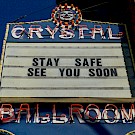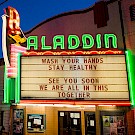 Supporting survivors starts with the survivor. Just like a pebble dropped in a pond, the inertia of recovery ripples outward. To learn how you can support, see Survivor Advocacy 101 at the end of this article.I’m sitting in what may be one of Portland’s last steadfast underground, all-ages punk and metal venues: Black Water. I’m out with some friends to check out local post-punk outfit Brave Hands and touring punk and goth bands Mallrat and Lucky Cat from New York. Lucky Cat, barely traceable on the internet, has become known in the underground hardcore scene as a vocal proponent of consent and songwriting about trauma, something I’ve been participating in as a songwriter and activist since my early 20s. As I wait for the band to finish their line checks, I bump into a friend—another musician in Portland who passionately uses her platform as an artist to draw attention to social turmoil. We lock eyes and there’s a moment where we’re not sure what to say. Then we point at one another and both shout, “You!” Onlookers might have thought we were in a tiff, but it was actually a moment of relief and understanding: “You get me, I get you; we need to talk.”
Supporting survivors starts with the survivor. Just like a pebble dropped in a pond, the inertia of recovery ripples outward. To learn how you can support, see Survivor Advocacy 101 at the end of this article.I’m sitting in what may be one of Portland’s last steadfast underground, all-ages punk and metal venues: Black Water. I’m out with some friends to check out local post-punk outfit Brave Hands and touring punk and goth bands Mallrat and Lucky Cat from New York. Lucky Cat, barely traceable on the internet, has become known in the underground hardcore scene as a vocal proponent of consent and songwriting about trauma, something I’ve been participating in as a songwriter and activist since my early 20s. As I wait for the band to finish their line checks, I bump into a friend—another musician in Portland who passionately uses her platform as an artist to draw attention to social turmoil. We lock eyes and there’s a moment where we’re not sure what to say. Then we point at one another and both shout, “You!” Onlookers might have thought we were in a tiff, but it was actually a moment of relief and understanding: “You get me, I get you; we need to talk.”
We both had just learned that a mutual friend had been assaulted by someone else we know in Portland’s niche and complicated music scene, and when you share that kind of vicarious trauma (as well as carry all of your own), there’s a deep, invisible bond with the person you share that with. We sat and worked through our thoughts and triggers, disclosing what we felt was appropriate and keeping what we needed to keep to ourselves. There’s a fine line when sharing thoughts about trauma, even with people you know well, and everybody’s line is drawn at a different distance than the next person’s. After debriefing, we each took a deep breath and then hugged, knowing we were not alone in supporting our friend or in facing injustice.
• • •
2018 was a challenging year for many people, and having a known rapist as our president has not made anything easier. In fact, for survivors of sexual trauma, it makes each day that much harder, that much more heavy and—at times—hopeless. It’s hard to see the light at the end of the tunnel when that tunnel is telling you that your experience is invalid. It also does not help that the secretary of education, Betsy DeVos, has rolled back survivor rights on college campuses with a pre-Title IX policy that moves to protect rapists (and the institutions themselves) rather than the victims of rape. As we’ve seen in nationally spotlit cases like Dr. Christine Blasey Ford’s (and let’s not forget Anita Hill’s underrated story that deservedly resurfaced during the Ford case), survivors of sexual trauma—even with the amount of support Ford had—still have their stories twisted, interrogated, misrepresented and, ultimately, dismissed. Ford has received so many death threats since the Kavanaugh hearings that a GoFundMe campaign, started on her behalf, raised almost $648,000 so she could hire protective security services to watch over her and her family for multiple months. This is the world we live in.
 For those of us who do not have legal and journalistic support behind us—which is the vast majority of us—who do we turn to when our stories aren’t heard? Where do we go when the perpetrator is our co-worker, or the local venue owner, or a fellow musician, or our “friend”? Do we turn to police enforcement, risking further traumatization by retelling our story over and over again and being victim-blamed for our own wounds? Do we turn to the internet to reclaim ourselves and feel supported by an online community? Or do we reach out to a hotline for the comforting voice of an advocate on the other end?
For those of us who do not have legal and journalistic support behind us—which is the vast majority of us—who do we turn to when our stories aren’t heard? Where do we go when the perpetrator is our co-worker, or the local venue owner, or a fellow musician, or our “friend”? Do we turn to police enforcement, risking further traumatization by retelling our story over and over again and being victim-blamed for our own wounds? Do we turn to the internet to reclaim ourselves and feel supported by an online community? Or do we reach out to a hotline for the comforting voice of an advocate on the other end?
There are so many forms of activism and so many different ways that survivors need support. Portland has the potential to lean in and respond responsibly in a time when the #MeToo wave sheds light on thousands of marginalized voices. It’s important to note that #MeToo only captures a fraction of these stories and there are still thousands of voices who aren’t being heard—either by choice or because many survivors don’t have access to the same resources as others. Sex workers, low-wage laborers and people who live with a disability have largely been left out of the #MeToo movement. In this new column on arts and activism, I’ll be talking about what Portland is already doing to create a trauma-informed music scene, but I’ll also keep it real and provide some cultural critique, because we have a long way to go before we can celebrate.
• • •
Portland is home to many local and nationally touring groups who are intentionally shaking things up and doing some truth-telling. Musicians like Ezza Rose, with her recent release No Means No (watch the title track's video at the end of this article), as well as Y La Bamba’s Mujeres come to mind. Others include folk-punk artist Amy Bleu who just released a #MeToo compilation CD on her own Veritable Vagabond Records (listen at the end of this article), or Ara Lee and Beth Wood’s soulful “Nasty Woman” (watch the music video below), which benefited Planned Parenthood. But those are just a few musicians out of many who probably identify as having something to say on the issue. Way before Trump’s election, there was the Riot Grrrl movement of the ’90s, spawning countless groups who hoped to elevate voices on the issue of trauma. And the more the #MeToo movement highlights gender-based violence as the result of widespread cultural misogyny, the easier it is to understand why women-identifying and non-binary folk would choose to work with people who identify similarly.
Tekiah Elzey, singer in the Portland-based feminist hardcore band Macho Boys, says that the #MeToo movement is partially responsible for her shift to primarily play, record and release music with women and non-binary folk.
“There’s starting to be more women and non-binary people involved in performing music, but the more behind the scenes you get, the less there are,” she tells. “I always try to book bands that aren’t just cis men; it’s actually a lot easier than you think! You’d think it was hard because there’s constantly all-male lineups, but those shows just seem lazy to me.”
Women have long been pushed to the fringe of hardcore, punk, metal and hip-hop, and when we are involved, we’re often tokenized by the men who “give us the opportunity”—which is condescending as shit. With established Portland venues closing doors over abuse allegations and members of the community coming forward to speak out about certain cases, one hopes that the greater music scene is finally waking up to the reality at hand.
But the music scene alone can’t capture how pervasive sexual violence is. State-sponsored killing and rape of women has existed for centuries across complicated geopolitical regions—a quick gander in many history books will easily prove that.
• • •
It’s important to start this conversation at the agreed bare minimum—like a recent tweet from rockstar writer on trauma Roxane Gay where she stated: “Pretty sure the number one cause of death for women is men.” Rebecca Solnit has also been a consistent truth-teller, years before the wave of #MeToo, regularly pointing out—via statistics—that women often die at the hands of men. But let’s just look at a few numbers because statistics have a way of telling stories.
 The National Coalition Against Domestic Violence reports, “Almost half of female (46.7 percent) and male (44.9 percent) victims of rape in the United States were raped by an acquaintance. Of these, 45.4 percent of female rape victims and 29 percent of male rape victims were raped by an intimate partner.” And this doesn’t even break down the complex statistics on same-sex couples, violence that targets people who are non-binary and identify across the gender spectrum, or the increased sexual and physical violence that results from racial profiling. Transgender people, particularly trans women of color, experience sexual violence at much higher rates than the general population.
The National Coalition Against Domestic Violence reports, “Almost half of female (46.7 percent) and male (44.9 percent) victims of rape in the United States were raped by an acquaintance. Of these, 45.4 percent of female rape victims and 29 percent of male rape victims were raped by an intimate partner.” And this doesn’t even break down the complex statistics on same-sex couples, violence that targets people who are non-binary and identify across the gender spectrum, or the increased sexual and physical violence that results from racial profiling. Transgender people, particularly trans women of color, experience sexual violence at much higher rates than the general population.
The numbers speak for themselves: Dominant culture props itself up on a long-established power structure based on violence that targets people of color, LGBTQIA, people with varying abilities, refugees and migrants, practitioners of non-Christian faiths, and women-identifying populations. This is the result of a colonialist and racist past, which is rooted in capitalism, and it’s been easier to see in our current harsh political climate (although it has existed for centuries).
While power structures are still predominantly enforced by white men, it’s important to debunk the myth that rape only happens to women, and only in dark alleys and only by strangers. It happens in broad daylight, usually by someone the victim knows, and is based in a need for power rather than sexual desire. It’s also important to note that men are victims and survivors of domestic abuse and sexual violence too. The reported number of men-identifying survivors is much lower than any other statistic, which is why so many groups focus efforts on women-identifying survivors, but everyone deserves as much healing and support as the next person. This may have to do with the fact that men report less than women, which can also be attributed to a society that tells men never to be weak or share their feelings. Men being taught to hide their emotions is an extremely unhelpful social norm that continues to do a lot of damage to everyone, including men.
• • •
On a recent tour in the U.K., I got to hang out with an organization called Safe Gigs for Women, a London-based advocacy group that tables at shows around England. Its goal is to be available for anyone who may need support at their shows—perhaps someone is triggered, or someone has just been harassed or assaulted, or they saw someone who previously assaulted them and they need help getting that person to leave. These individuals do the difficult and important work of intervening and supporting when needed, and “staying in their lane” when they aren’t.
 Read more stories about Portland artists who are sharing their #MeToo message and creating change in our current issue: Cover illustration by Lisa KohnBack in Portland, I chatted with Meara McLaughlin, executive director for the new industry advocacy group MusicPortland. Alongside lobbying for musician loading zones and protections for venues, McLaughlin says MusicPortland takes a strong position not just against oppression, but a stance for trauma-informed venue owners and staff. “It’s not enough to put signs up in bathrooms or on bar walls that read: ‘See Something, Say Something,’” McLaughlin says. “We need trained staff at venues to understand a trauma-informed protocol and respond to those instances in a way that deescalates rather than heightens triggers.”
Read more stories about Portland artists who are sharing their #MeToo message and creating change in our current issue: Cover illustration by Lisa KohnBack in Portland, I chatted with Meara McLaughlin, executive director for the new industry advocacy group MusicPortland. Alongside lobbying for musician loading zones and protections for venues, McLaughlin says MusicPortland takes a strong position not just against oppression, but a stance for trauma-informed venue owners and staff. “It’s not enough to put signs up in bathrooms or on bar walls that read: ‘See Something, Say Something,’” McLaughlin says. “We need trained staff at venues to understand a trauma-informed protocol and respond to those instances in a way that deescalates rather than heightens triggers.”
MusicPortland’s vision and Safe Gigs for Women are great starts to making music circles more aware that yes, harassment and assault happen to people at all levels and in all kinds of spaces, and there is an appropriate, skill-based way to respond to these kinds of situations. What does this mean for future advocacy groups in Portland? Do we need to shift public funding to create specific social work positions at venues? Will that address the root cause of sexual violence? It might not immediately address it, but it’d be a start.
• • •
 The way forward is nonlinear and messy. Some steps may feel like compromises, and some might even feel like shit. But the healing isn’t going to happen overnight, and the work will need to continue especially when sexual violence isn’t making headline news, because most #MeToo stories don’t. Activists, artists, teachers, lobbyists and good politicians work day in and day out to come up with sustainable, creative ways to shift our culture towards healing—and it is indeed a long haul. When art and activism work together, it isn’t flashy; it’s difficult and often goes unrewarded.
The way forward is nonlinear and messy. Some steps may feel like compromises, and some might even feel like shit. But the healing isn’t going to happen overnight, and the work will need to continue especially when sexual violence isn’t making headline news, because most #MeToo stories don’t. Activists, artists, teachers, lobbyists and good politicians work day in and day out to come up with sustainable, creative ways to shift our culture towards healing—and it is indeed a long haul. When art and activism work together, it isn’t flashy; it’s difficult and often goes unrewarded.
But we don’t do it for short-term rewards, right? We do it because we care about this city and the people in it. We do it because, despite how shitty 2018 was, we can’t help but imagine a time when—just maybe—we can go to a gig or a party or school or work and not worry about getting hurt.
Olivia Awbrey is a songwriter, multi-instrumentalist and activist from Portland. Find out where she's playing next.
Survivor Advocacy 101
 Believe Survivors
Believe Survivors
The biggest challenge many survivors face when coming forward with their story is finding the right support network of people who will believe them and their story. Believing that someone’s experience is true and validating what they disclose to you is already a step in the right direction.
Hold Space
 It’s very common for survivors to experience post-traumatic stress disorder, and it’s common for advocates to experience vicarious PTSD. Smell, taste, touch and visual stimulants can bring about flashbacks that intensify PTSD symptoms, which include anxiety, fear, stress and nervousness. It’s important to hold space for survivors and allow them to feel what they are physiologically experiencing. Continue to validate their experience and listen to what they say they need.
It’s very common for survivors to experience post-traumatic stress disorder, and it’s common for advocates to experience vicarious PTSD. Smell, taste, touch and visual stimulants can bring about flashbacks that intensify PTSD symptoms, which include anxiety, fear, stress and nervousness. It’s important to hold space for survivors and allow them to feel what they are physiologically experiencing. Continue to validate their experience and listen to what they say they need.
Practice Privacy
 If someone opens up to you about an experience they had, keep in mind they’ve probably told you because they find you to be an emotionally responsible person who can offer support in this area. Whether or not you’re able to provide that emotional responsibility is up to you, but if you are able to support, remember that they opened up to you because they trust you and they may ask you not to share this information with anyone else. It’s difficult not to go to someone’s parents or the police, and in some cases that is absolutely necessary (especially if you’re a mandatory reporter), but there are times when someone just needs to share their experience with someone they trust. This is a tricky area. It’s helpful to reach out for your own support (like a crisis hotline) if you’re in this kind of situation.
If someone opens up to you about an experience they had, keep in mind they’ve probably told you because they find you to be an emotionally responsible person who can offer support in this area. Whether or not you’re able to provide that emotional responsibility is up to you, but if you are able to support, remember that they opened up to you because they trust you and they may ask you not to share this information with anyone else. It’s difficult not to go to someone’s parents or the police, and in some cases that is absolutely necessary (especially if you’re a mandatory reporter), but there are times when someone just needs to share their experience with someone they trust. This is a tricky area. It’s helpful to reach out for your own support (like a crisis hotline) if you’re in this kind of situation.
Self-Care & Boundaries
 If you are supporting someone who has disclosed that they have been assaulted, it’s important to find support for yourself as well. Practicing self-care means taking space when you need it and finding the people or the activity that will refill your cup. You could take a bubble bath, hike in the mountains, talk to a loved one, or go to a show. Draw healthy boundaries—it’s okay to take breaks and ask for space when you need it. This is not selfish, it’s human!
If you are supporting someone who has disclosed that they have been assaulted, it’s important to find support for yourself as well. Practicing self-care means taking space when you need it and finding the people or the activity that will refill your cup. You could take a bubble bath, hike in the mountains, talk to a loved one, or go to a show. Draw healthy boundaries—it’s okay to take breaks and ask for space when you need it. This is not selfish, it’s human!
Resource Guide
The following organizations provide advocacy and ongoing support to survivors of sexual and domestic abuse in Multnomah, Washington and Clackamas counties:
▶ Call to Safety
▶ Bradley Angle
▶ Sexual Assault Resource Center
▶ Clackamas Women’s Services
These groups in Multnomah County provide additional support:
▶ Q Center: Safe spaces, community building and empowerment for the positive transformation of LGBTQ2SIA+ communities and allies
▶ Raphael House: Advocacy, shelter and ongoing support to survivors of sexual and domestic abuse
▶ Outside In: Health and social services for homeless youth and other marginalized people









